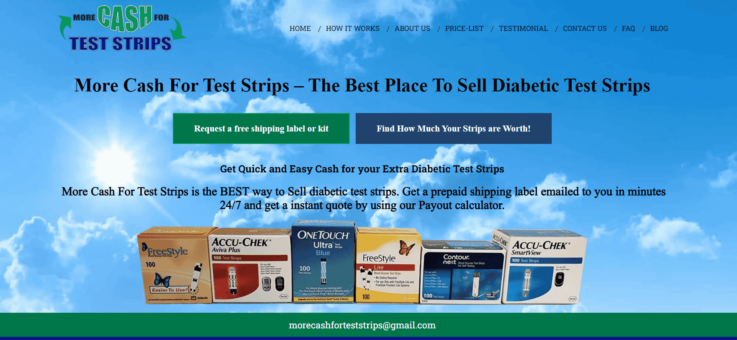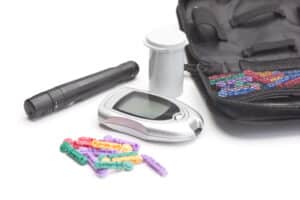
Selling Diabetic Supplies To More Cash For Test Strips In Seconds
Posted on June 17, 2022 at 12AM
Selling Diabetic Supplies To More Cash For Test Strips In Seconds
Handling diabetic supplies with care is crucial, as they are an integral part of medicine. Many people are on the lookout for these supplies and want to make sure they are gaining access to solutions that will be worth it over time.
With this in mind, it’s time to start selling diabetic supplies immediately. You will have the chance to make a good amount of money by going down this path, as the right type of diabetic supplies is always in demand. Selling these supplies to trusted buyers can often be done quickly, sometimes in seconds. Selling diabetic supplies for cash can be completed in under 60 seconds through reliable online platforms.

Here is a look at what you will get by going down this path.
Great Rates
The rates you will receive for diabetic supplies will be as important as any other element in the process. You will want to ensure the margins are good and you get access to cash that will make it worthwhile over time.
If that is the standard you hope to set, then you will know this is the only way. Selling quality diabetic supplies will always make a difference and provide peace of mind due to the quality of the supplies.
Instant Quotes
The quote you will receive when selling diabetic supplies is essential. It would be best to refrain from settling for a long-winded approach that will not conclude as soon as you want, and this becomes frustrating and is the last thing you will want to deal with.
It’s best to go down a path where you receive an instant quote, which works out as planned.
You will receive what you are looking for here. The cash deal will be approved and completed promptly.
Easy Cash
The most important part of the process will involve the funds you will receive. That is essential when you want to do things correctly and get total value for your diabetic supplies. There is no reason to settle for an inferior return when you don’t have to.
Keep things simple, and know you will receive an exceptional deal as soon as you go down this path.
The cash will be in your hands immediately, and getting the supplies to the main office will also be a breeze.
Prepaid Shipping Labels
We will prepare the shipping labels for you to use. It is vital when starting to sell diabetic supplies on the open market.
You will want the shipping labels ready to go, and they will be here. It is a great way to start selling diabetic supplies for cash and getting a deal that will be worth it.
If you are considering selling diabetic supplies, making it as cost-effective as possible is advisable. Prepaid shipping labels are highly recommended for sending diabetic supplies to the main office. The demand for diabetic supplies has increased due to the rising number of people with diabetes.
It will simplify everything for you and ensure the cash is in your hands as soon as you want it to be.
Fast Approval
The approval rate is one part of the process when selling diabetic supplies, but it is also essential to consider the speed at which things happen. You want to avoid ending up in a situation where the results are coming through as soon as you want them to.
It’s best to look at approval options that will be effective over the short and long term. The results will not only be good, but you will feel confident in the value you are getting too.
Accredited Solutions
The charm of this option is knowing each supply being passed through is vetted. You will get the funds that are rightfully yours when it is time to start selling supplies. With the right diabetic supplies, you are getting the real deal, and the process will work just how you want them to.
It is integral for those who want to sell the correct type of supplies and do not want to cut corners along the way.
You will end up with a solution that is well done and will work like a charm too.
Proven
Selling diabetic supplies that will be bought for cash and work out for both parties is one of the best things a person can do, and going with a proven option adds to its charm. It is one of the most critical elements, as you will want to believe in what you are selling.
It is crucial as you begin to analyze your options and pinpoint the value you will get with the process as soon as the supplies are sold.
By going with a proven option, you will know it will work out well.
Great Conversion Rate
The most important thing to account for is the conversion rate. Nothing is worse than attempting to sell supplies that will not convert and ending up with no one to buy. It is a legitimate concern with some products on the open market but not here. You will know this is an option that is the real deal and will work out the way you want it to.
When you start selling diabetic supplies, you will want to think about everything, including your approach and the value you receive from the process over the long haul. If you aim to ensure you sell with a purpose, then you should begin here. Test strips, lancets, and glucose meters are commonly sold diabetic supplies.
The service will be outstanding, and you will sell a lot for cash.
It is all about getting a fair deal and converting diabetic supplies into cash. If that is what you want, you will be satisfied; this is the real deal.

Where to Sell Diabetic Supplies
There are various companies out there that cater to diabetics and patients needing diabetic supplies. These companies, easily found with a quick Google search, provide a convenient and competitive way to buy and sell these essentials. The process is usually simple:
- Registration – Start by signing up on the website or app of your choice. This step usually involves creating an account with some basic information.
- Listing – After registration, you can list your unused diabetic items for sale and provide the test strips price-list. Be sure to include details like the brand, quantity, expiration date, and condition of the items you’re selling. This helps potential buyers know exactly what they’re getting.
- Quote – Once your items are listed, you’ll typically receive a quote from the company based on the information you provided. This gives you an idea of how much you can expect to earn from your sale.
- Shipping – If you agree with the offered price, the next step is to ship your supplies to the buyer. The company will provide you with a shipping label, making the process hassle-free. Simply package your items securely and drop them off at your local post office or schedule a pickup with USPS.
- Payment – After your shipment is received and verified by the company, you can expect to receive your payment promptly. Many companies offer various payment options, including PayPal, Zelle, or even direct deposit into your bank account.
By following these steps, you can easily turn your unused diabetic supplies into extra cash. Selling unused or unexpired diabetic supplies can help prevent waste and provide financial support for those in need. Plus, you’re helping others in need who may not have easy access to these essential items. It’s a win-win situation that benefits both sellers and buyers alike. If you’re ever unsure about a company, be sure to check out reviews on sites like Trustpilot or ask for recommendations from friends and family. With a little research, you can find a reputable company that meets your needs and concerns while contributing to the diabetic community and the economy as a whole.
How to Package and Ship Diabetic Supplies for Sale
Packaging and shipping diabetic supplies for sale requires careful consideration to ensure items reach buyers safely and in optimal condition. Here’s a detailed guide on how to package and ship diabetic supplies effectively:
- Gather Necessary Supplies – Before you start packaging, gather all the necessary supplies, including boxes, bubble wrap, packing tape, labels, and any other protective materials.
- Inspect the Items – Thoroughly inspect each diabetic supply item to ensure they are in good condition, free from damage or defects. Discard any expired diabetic test strips or damaged items.
- Choose Appropriate Packaging – Select packaging materials that provide adequate protection for the diabetic supplies during transit. Use sturdy boxes that are appropriately sized to accommodate the items without excessive movement.
- Wrap Individual Items – Wrap each diabetic supply item individually with bubble wrap or tissue paper to prevent them from bumping into each other and causing damage during shipping. Pay special attention to fragile items like glucose meters or insulin pumps.
- Secure Items in the Box – Arrange the wrapped items neatly in the box, ensuring there is enough padding between each item and the sides of the box. Fill any empty spaces with additional packing material to prevent shifting during transit.
- Include Necessary Documentation – Place any necessary documentation, such as instructions for use or expiration dates, inside the package. This information can be crucial for the buyer’s reference.
- Seal the Package Securely – Use high-quality packing tape to seal the box tightly. Make sure all seams and corners are securely secured to prevent the package from opening during shipment.
- Label the Package – Clearly label the package with the recipient’s address, including their name, street address, city, state, and zip code. Include your return address as well.
- Consider Shipping Method – Choose a shipping method that suits your budget and delivery timeframe. Consider options like USPS, UPS, FedEx, or courier services based on the package’s size, weight, and destination.
- Purchase Insurance and Tracking – Consider purchasing shipping insurance and tracking services for valuable diabetic supplies. This provides added protection and allows both you and the buyer to monitor the package’s journey.
- Communicate with the Buyer – Once the package is shipped, communicate with the buyer and provide them with the tracking information. This keeps them informed and reassured about the status of their order.
- Follow Up After Delivery – After the package is delivered, follow up with the buyer to ensure they received the diabetic supplies in good condition. Encourage them to reach out if they have any questions or concerns.
By following these steps, you can package and ship diabetic supplies for sale with confidence, ensuring a positive experience for both you and the buyer.
Best Ways to Get Cash for Test Strips
When it comes to selling test strips for cash, there are several effective methods to consider, each with its own advantages and considerations:
- Online Marketplaces – Utilizing popular online platforms like eBay, Amazon, or dedicated diabetic supply websites can be one of the best ways to get cash for test strips. These platforms offer a wide reach, allowing you to connect with a large audience of potential buyers. You can list your test strips for sale at competitive prices, and transactions can often occur quickly, providing you with cash in hand within a short timeframe. However, it’s essential to ensure accurate descriptions, clear images, and prompt communication with buyers to maintain a positive reputation and maximize sales.
- Local Classifieds and Community Groups – Selling test strips through local classified ad websites like Craigslist or community groups on social media platforms such as Facebook Marketplace can be another effective option. By targeting buyers in your area, you may be able to facilitate faster transactions and avoid shipping costs. Additionally, direct interactions with local buyers can provide opportunities for negotiating prices and building rapport. However, it’s crucial to exercise caution when arranging meetups for transactions and verify the legitimacy of buyers to ensure a safe and smooth selling experience.
- Diabetes Support Forums and Groups – Engaging with online communities and forums dedicated to diabetes can be a valuable way to sell test strips. These platforms often have sections for buying and selling diabetic supplies, allowing you to connect with individuals who understand the importance and value of test strips. By participating in these communities, you can build trust with potential buyers and potentially secure repeat business. Just be sure to adhere to group rules, provide accurate information about your test strips, and ensure secure payment and shipping arrangements.
- Diabetic Supply Buyers – Some specialized platforms are exclusively dedicated to buying and selling diabetic supplies. These platforms cater specifically to the diabetic community, providing a targeted audience of buyers who are actively seeking test strips. While you may find convenience in using these platforms, it’s essential to compare offers to ensure you’re getting the best price for your test strips.
Ultimately, the best way to get cash for test strips will depend on your preferences, priorities, and the level of effort you’re willing to invest. Whether you choose to sell online through established marketplaces, local channels, or specialized platforms, prioritizing transparency, accuracy, and safety throughout the selling process will help you maximize your earnings and ensure a positive experience for both you and your buyers.

Starting a Business Selling Diabetic Supplies
When starting a business selling diabetic supplies, it’s crucial to have a comprehensive understanding of the market and regulatory landscape. Type 2 diabetes affects a significant number of Americans, necessitating reliable sources for diabetic tools and medications. Before launching a website or setting up shop, research is essential to understand pricing, payment methods, and state regulations regarding the sale of medical supplies.
Consulting with a healthcare provider or doctor can provide valuable insights into the needs and preferences of individuals managing their blood sugar levels. Additionally, exploring reputable platforms like Trustpilot can help gauge customer satisfaction and tailor the business accordingly. Ensuring that orders are processed efficiently and securely, whether through an online store or mail order, is paramount.
By addressing these aspects and providing quality products, businesses can contribute to alleviating the problems faced by those living with diabetes and offer valuable solutions to their symptoms and overall health, including potential complications related to thyroid disease.
Conclusion
When it comes to managing diabetes, having reliable information at your fingertips is crucial. Whether you’re seeking advice on diet, looking for ways to manage your condition, or exploring different payment options for supplies, having a trustworthy source is essential. Websites like Trustpilot can provide valuable insights into the reliability of various platforms, offering reviews from real users. From understanding the risks associated with certain foods to finding ways to monitor your blood sugar levels effectively, having access to accurate content can empower individuals to take control of their health. Whether you’re newly diagnosed or have been managing diabetes for some time, having the right information at hand can make all the difference in effectively managing your condition and living a healthy life.
Selling unused diabetic supplies is a practical way to declutter while supporting others in need. By participating in the market for diabetic supplies, you not only unlock cash but also contribute to a community-driven effort to make essential healthcare more accessible. Whether you’re looking to sell test strips, lancets, or insulin supplies, explore the various platforms available and embark on your journey to turning surplus supplies into meaningful resources.
FAQs
Here are some questions about selling diabetic supplies to More Cash For Test Strips in seconds:
Q. What is the process for selling diabetic supplies?
Selling diabetic supplies typically involves several straightforward steps. First, you’d need to acquire the necessary inventory, such as glucose meters, diabetes test strips, lancets, and insulin supplies, either through wholesalers or directly from manufacturers. Next, establish a sales channel, which could include online platforms, pharmacies, medical supply stores, or direct sales to health care facilities. Ensure compliance with any regulatory requirements governing the sale of medical devices and diabetic supplies. Finally, market your products to your target audience, emphasizing their quality, reliability, and affordability. Providing excellent customer service and support can also help build trust and loyalty among customers.
Q. Which platform offers the best prices for selling test strips?
Determining the platform offering the best prices for selling test strips depends on various factors such as the brand, condition, and demand for the specific test strips. Online marketplaces like eBay, Amazon, or specialized medical supply websites often provide avenues for selling test strips. Additionally, local community forums or social media groups might offer opportunities for direct sales. Researching prices across multiple platforms and considering factors like seller fees, shipping costs, and ease of use can help identify the platform offering the most favorable prices for selling test strips.
Q. What information do I need to provide when selling diabetic supplies?
When selling diabetic supplies, you typically need to provide essential information such as the name and quantity of the supplies being sold, the brand or manufacturer, the expiration date (if applicable), any relevant certifications or approvals, and clear instructions for use. Additionally, you may need to include information about storage conditions, potential side effects or risks, and contact details for further inquiries or assistance. Ensuring transparency and accuracy in the information provided is crucial for the safety and satisfaction of customers relying on these supplies for managing their health.
Q. Why Sell Diabetic Supplies?
Unused diabetic supplies, like test strips, can pile up in your box because of changes in treatment, overstocking, or when they expire. But don’t toss them! Selling these items can help diabetics and patients who need them while putting some extra dollars in your pocket. It’s an easy way to clear out clutter and make some cash. Buyers, especially those without enough insurance coverage, can get these essential supplies at a better price.
Q. What are the requirements for selling diabetic supplies?
To sell diabetic supplies, you typically need to ensure that the products are unopened, unused, and within their expiration date. It’s essential to accurately describe the items’ condition and provide clear images if selling online. Additionally, some platforms may require sellers to adhere to specific guidelines or regulations, especially when selling medical supplies. Depending on the platform, you may need to create an account, agree to terms of service, and provide necessary information such as contact details and payment preferences. Overall, transparency, honesty, and compliance with relevant laws and regulations are key requirements for selling diabetic supplies responsibly.
Q. Is there a platform that buys diabetic test strips?
Yes, there are platforms specifically designed for buying diabetic test strips. One such platform is More Cash for Test Strips, which specializes in purchasing various diabetic supplies, including test strips. These platforms provide a convenient and straightforward way for individuals to sell their surplus or unused test strips for a fair price.
Q. Where can I find a local buyer for my test strips?
Finding a local buyer for your test strips can be relatively easy. You can start by checking online platforms such as Facebook Marketplace, Craigslist, or local classified ads websites where you can list your items for sale. Additionally, you might explore community forums or groups dedicated to diabetes support where members may be interested in purchasing test strips. Don’t forget to ask friends, family, or acquaintances who may know someone in need of test strips. Lastly, consider reaching out to local pharmacies or diabetic supply stores to inquire if they buy back unused test strips. By exploring these avenues, you increase your chances of finding a local buyer for your test strips.
Q. What are some reputable companies that buy test strips?
Several reputable companies specialize in buying test strips from individuals. These include More Cash for Test Strips, Test Strips 4 Money, Sell Test Strips Here, Cash for Diabetics, and Quick Cash 4 Test Strips. These companies offer a straightforward process for selling unused or surplus test strips, typically requiring sellers to provide information about the brand, expiration date, and quantity of the strips they wish to sell. Sellers can then receive payment via various methods, such as PayPal or check, after sending the test strips to the company through mail. It’s essential to research and choose a reputable company with positive reviews and transparent policies to ensure a smooth and reliable selling experience.
Q. Do I need a prescription to sell my test strips?
Finding buyers for your diabetic supplies can be straightforward with a few simple steps. First, consider selling on online platforms like eBay, Amazon, or specialized diabetic supply websites. These platforms attract a wide audience of potential buyers. Additionally, utilize social media platforms like Facebook or Instagram to reach out to interested individuals or join online communities and forums dedicated to diabetes where you can advertise your supplies. Don’t forget to spread the word among friends, family, and local diabetic support groups. Lastly, ensure your listings are clear, accurate, and include appealing images to attract buyers effectively. With these methods, you can connect with individuals in need of diabetic supplies and facilitate successful transactions.
Q. Who provides instant payment for test strips?
Several platforms offer instant payment for test strips, providing convenience for sellers looking to quickly monetize their surplus supplies. Companies like Diabetic Supply Buyers specialize in purchasing diabetic supplies directly from individuals, offering fast and hassle-free transactions. Through their streamlined processes, sellers can receive payment promptly upon completing the sale of their test strips. This option is particularly beneficial for individuals seeking immediate financial compensation for their unused diabetic supplies.
Q. How much more cash can you potentially earn by selling diabetic supplies, specifically test strips, online compared to traditional methods?
Selling diabetic supplies, especially test strips, online can potentially earn you more cash compared to traditional methods due to several factors. Online platforms like eBay, Amazon, and dedicated diabetic supply websites offer access to a larger pool of potential buyers, allowing for competitive pricing and faster sales. Additionally, selling online eliminates the need for intermediaries, reducing overhead costs associated with traditional brick-and-mortar stores or local selling methods. Moreover, online selling provides convenience for both sellers and buyers, enabling transactions to occur 24/7 without geographical limitations. Overall, leveraging online channels for selling diabetic supplies can maximize your earning potential by reaching a broader audience and streamlining the selling process.
Sell Diabetic Test Strips Today
Are you looking to sell your diabetic test strips? Look no further! At More Cash for Test Strips, we offer a quick and hassle-free way to turn your new, unopened, and unused boxes of diabetic test strips into money and cash. Sell test strips for diabetes now and experience the convenience of More Cash for Test Strips!
If you have any questions or want more information, contact us at (310) 892-2808.

